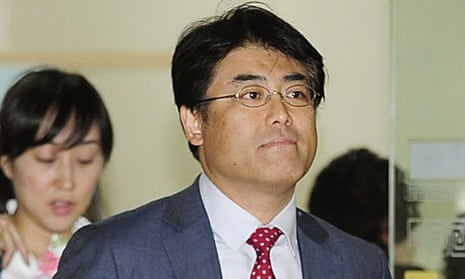Tokyo has summoned a South Korean minister to protest after a Japanese journalist was charged with defamation over a story about the country’s president, Park Geun-hye.
Tatsuya Kato, who until 1 October was the Seoul bureau chief for the conservative Japanese newspaper Sankei Shimbun, was indicted on Wednesday on suspicion of criminally libelling Park, a charge that could see him jailed for up to seven years.
Kato, 48, has been under investigation since August and has been banned from leaving the country over a 3 Augustcolumn about rumours concerning Park’s whereabouts on the day the Sewol passenger ferry sank, with the deaths of 300.
Kato’s story used some original quotes from his own sources, but it was chiefly based on information already available online, and which has not been the subject of any complaint. The story picked up rumours circulating in the South Korean media that Park was with another man at the time of the sinking.
The Japanese foreign ministry summoned Kim Weon-jin, a minister at the South Korean embassy in Japan, “to convey our message that we are gravely concerned about the indictment … in light of press freedom and the Japan-South Korea relationship,” the chief cabinet secretary, Yoshihide Suga, told reporters.
The Seoul Foreign Correspondents’ Club issued an open letter on Wednesday to Seoul’s prosecutor general, Kim Jin-tae, saying it was “deeply concerned that … its decision of indictment could result in severely interfering with the journalists’ right to reporting”.
Reporters Without Borders has also defended Sankei Shimbun, arguing the subject of the paper’s column was clearly in the public interest.
Prosecutors in Seoul began questioning Kato on 18 August as a result of complaints filed by an association of South Korean citizens, the group noted, adding that he remained under surveillance and his freedom of movement has been curtailed.
Takamitsu Kumasaka, the president of Sankei Shimbun, a paper known for being critical of South Korea and which is unpopular there, said he “strongly protests and demands retraction” of the indictment.
“It is an extremely abnormal action for a democratic country which makes provision for freedom of expression in its constitution,” Sankei said in an editorial.
A US state department spokeswoman, Jen Psaki, said on Wednesday that Washington was aware of Kato’s indictment. “We broadly support freedom of speech and expression,” she told reporters, noting that the state department had in the past expressed concern “about the law on the books in South Korea” which stipulates criminal defamation.
No one from South Korea’s prosecuting authorities was available to comment.

Comments (…)
Sign in or create your Guardian account to join the discussion